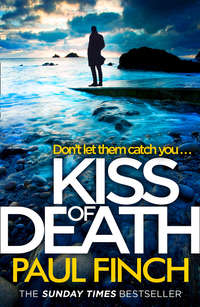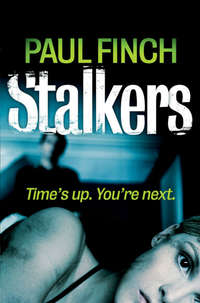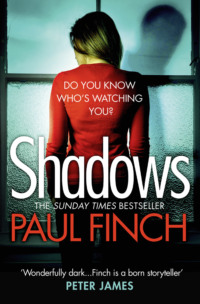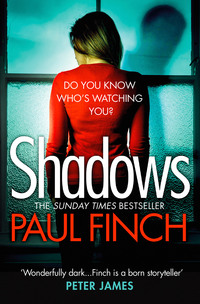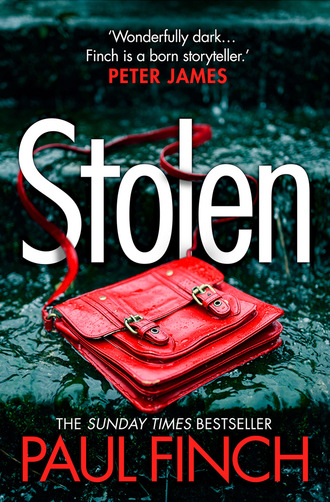
Полная версия
Stolen
Sister Cassie was thoughtful. ‘The last one is a little more troubling. For a brief time, I was unsure whether to include him on the list, because he can really be rather naughty. Frederick Holborn … you know him?’
Lucy shook her head.
‘Ah. Probably a good thing. No doubt he would attempt to impugn your honour.’ The ex-nun arched a disapproving eyebrow. ‘As he regularly does mine.’
‘I’m sorry …’ Lucy was puzzled. ‘You’re saying he’s assaulted you?’
‘Perhaps “assault” is too strong a word. Let’s just say that he has several times sought sexual favours from me. I think he regards my religious calling as a challenge to be overcome.’
From what Lucy knew, it wouldn’t have been much of a challenge. Sister Cassie might don the trappings of a nun and adopt the role of carer with her fellow vagrants, but she had a heroin habit all of her own, and she needed to earn the money for it.
‘I almost stopped including him in my nightly rounds,’ the ex-nun added, ‘but though drink and other poisons have ravaged many of these poor creatures to a point where they are closer, frankly, to God than they are to men, they still have needs and desires. I don’t mind admitting, there’ve been times when I’ve almost complied—’
‘Sister, please. If you’re not actually making a complaint against Fred Holborn, can we get to the point?’
‘Well, he’s vanished too, child. Completely … as if he was never put on this Earth.’
The door opened, and Tessa Payne stuck her head in. ‘Sorry, Lucy, but Sergeant Cullen’s wondering what the delay is.’
Lucy signalled that she’d be out shortly.
‘You’re a very kind person, Sister,’ Lucy said. ‘And I know you genuinely care for those in want. The fact you make these nightly rounds at all is … well, it’s going to win you a lot of brownie points with the Lord, even if it doesn’t get you anything down here.’
The ‘nightly rounds’ she referred to were a real thing. Sister Cassie spent the best part of each day scavenging what scant supplies she could – food, drink, cigarettes, money – and despite holding some back in order to feed her own habit, was often able to make a nightly circuit of the doorways, sewers and underpasses where so many of Crowley’s homeless bedded down, doling out whatever she could to the most needy, or sometimes simply offering company and comfort.
‘But the first point I made still stands,’ Lucy said. ‘Edna Davis, Ronald Burke and Fred Holborn … they might just have wandered off.’
Sister Cassie shook her head.
‘Look,’ Lucy said, ‘they may have been fixtures in Crowley for years, but there’s nothing to keep them here.’
‘I know these people well, child. None of them have anywhere else to go.’
‘What do the others think?’ Lucy asked. ‘I mean, the rest of your community.’
‘They’re as worried and bemused as I am.’
‘So why haven’t they come forward? You say Ronald Burke vanished two or three weeks ago.’
‘My child … they will not come into a police station.’
‘Why not?’
‘They don’t trust you. And why should they? One young lady I see on my regular rounds … she was raped by a gang of men some nine months ago. Not just raped, sodomised too. It was a terrible attack and I know, because I’m the one who cared for her afterwards and persuaded her to go to the police station.’
‘I don’t remember this,’ Lucy said.
‘It wasn’t here at Robber’s Row, it was at Cotehill Crescent.’
‘Okay, and …?’
‘Well …’ Sister Cassie sighed again. ‘It’s a sad tale already, but it gets sadder still. While the police ladies were helping her undress for examination by the nurse, they found certain substances. As such, this young lady herself was questioned. It made her feel very uncomfortable … as if she wasn’t already uncomfortable enough.’
‘I do remember that one, actually,’ Lucy said. ‘That young lady had quite a bit of heroin on her, and several uncapped needles, all of which she failed to mention. As a result, one of the policewomen assisting got her finger pricked and had to go through all kinds of health checks afterwards. Are you surprised they got cross with her?’
‘It doesn’t matter. They were searching for evidence that might have incriminated the young lady’s attacker, and they ended up making a fuss about evidence which might well have incriminated the young lady herself … and for something completely unconnected with the original complaint. So, you see, child, my community, as you call it, is not very keen on your community.’
Unconnected with the original complaint …
Lucy thought about that, wondering why it seemed meaningful.
And then the penny dropped.
‘Is everything all right?’ Sister Cassie said, noting Lucy’s gradual change of expression.
Lucy stood up stiffly. ‘Sister … I have some rather pressing business, I’m afraid.’
The ex-nun nodded sagely, and she too made to stand. ‘Of course.’
She smiled as she pulled on her cloak and picked up her satchel. She wasn’t being sarcastic. This was one of the disarming things about her: despite everything, she still radiated charm and civility. Even with the occasional admonitions, her attitude throughout the short interview had mainly been one of gratitude that a police officer had found time for her.
Lucy showed her out into the front waiting room. ‘I’ll come and find you,’ she said. ‘It won’t be tomorrow – I’ve got too much on, and I’ve got Friday off. Over the weekend, maybe?’
‘Of course.’
‘Where will you be? St Clement’s Avenue, is it?’
‘That’s my usual haunt, child.’ The ex-nun opened the front doors to leave.
‘I’m serious, Sister,’ Lucy said. ‘I’ll come down there and look you up.’
But the ex-nun was already walking away along Tarwood Lane, her robes flapping behind her. She waved one-handed, without looking back.
Briefly, Lucy was discomforted by the thought of the woman travelling all the way back to St Clement’s Avenue alone and on foot. Even if she got there safely, St Clement’s was one of the most dangerous neighbourhoods in the borough. But that was Sister Cassie’s life all over: the streets, the darkness, the isolation – she was no stranger to any of it. Besides, Lucy had more important things to do at present than offer rides to hobos.
Such as once and for all squashing a very nasty, very self-confident little bug.
Chapter 4
Lucy drove back to Wellspring Lane at speed. All the way, three sentences replayed themselves over and over through her head.
I wouldn’t be surprised if it was the thin end of the wedge.
If they’re prepared to do this, what else are they up to?
Those first two, courtesy of the laconic Joe Cullen.
Completely unconnected with the original complaint …
That latter the homespun street-wisdom of Sister Cassiopeia.
It was now very late, past midnight, so though Wellspring Lane was at the extreme southern end of the borough, away from most residential districts and edging onto the famous Chat Moss, there was almost no other traffic on the road. Lucy got her foot down nevertheless, concerned that the search of Mahoney’s premises might be approaching its end.
She was only just in time, bouncing her Suzuki Jimny down the rutted track to the farm cottage, swerving at speed around the abandoned vehicles there, and seeing Malcolm Peabody and three other constables outside the building, next to what looked as if it was the last divisional van on site. They were still in protective clothing, but even as Lucy arrived, gloves were coming off and the press-studs down the fronts of overalls being plucked open.
Peabody advanced, grinning, as she screeched to a halt in the farmyard.
‘We’ve bagged and boxed everything,’ he said. He tapped the side of the van. ‘We’ve got enough here to do such a number on this Mahoney wanker that he’ll never forget it.’
‘Did you find the jewelled collar?’ she asked, jumping out.
‘Erm, no.’ Peabody pondered. ‘But he’s banged to rights. Photographic have only just gone, and they’ve got loads of stuff too.’
‘Any other animals?’
‘Only the ones we found before.’
‘What about the black van?’
He shook his head, frowning as he sensed her displeasure. ‘No sign of any van on these premises. We’ve been through all the outbuildings. But Luce, we’ve got him – we caught him at it.’
‘We’ve got him for dog-fighting, Malcolm – not something that’s going to see him do serious time.’ She entered the cottage via its still open door. ‘Everyone, come in here, please.’
The other officers trooped inside, joining her in a small, cluttered kitchen.
All kinds of revolting mess filled its central table and surrounding worktops. The dull lighting and low, beamed ceiling only added to the gloom and the cramped atmosphere. The door had been open for hours now, but there was still a staleness in the air, a vague odour of spoiled food.
‘How thoroughly have you searched this house?’ she asked, her gaze roving from one blank, tired face to the next.
‘We’ve had a look around,’ Peabody answered, ‘but we gathered so much evidence from the barn and the outbuildings—’
‘So you’re saying you’ve not searched it at all?’ she interrupted, visibly vexed.
‘We’ve had a look around.’
‘What does that mean, Malcom? A cursory look? You’ve checked in a few drawers?’
No one spoke, but several shamefaced glances were exchanged.
‘Come on, Lucy,’ Peabody protested. ‘We’re looking for evidence of organised dog-fighting. And we’ve found it outside. Stacks of it. What exactly could he keep in here?’
‘I found some paperwork,’ a young policewoman called Laurie Darlington chipped in. ‘It was in a cupboard in the dining room. So I put it in the van.’
‘Show me,’ Lucy said.
They went back outside and opened the van. PC Darlington rummaged among the boxes and various plastic bags before lifting a clear plastic envelope tagged LD1, containing a bundle of dirty documents stapled together. Lucy didn’t unseal the paperwork but examined what she could of it through the plastic. Though the top sheet had been scribbled on almost unintelligibly, close analysis suggested that it was a customer log, detailing names and the services provided, plus payments and the like.
‘This is good,’ Lucy said. ‘In fact, this is excellent. But just at present it’s not what we’re looking for. Inside again, everyone, please.’
Lucy held the same rank as the search officers, but they deferred to her naturally, not just because of her length of service, twelve years, but because she’d been point-man on this operation from the start, and because, even though a lowly divisional detective, she already had a rep for breaking tough cases.
‘Here’s the deal,’ she said, when they were back in the kitchen. ‘We’re fully authorised to search this pad, so I want every inch of it going over, yeah? If necessary, it needs physically ripping apart.’
There were thinly veiled groans. Most of these officers, including Peabody, had been on duty for several hours after their normal shifts had supposedly finished. They were being paid for it, but inevitably fatigue was setting in.
‘Seriously, Lucy?’ Peabody groaned. ‘All this for a dog-collar?’
‘Anything we can hit this bastard with, we have to do it,’ she said.
‘Won’t he have sold it on by now?’ another copper asked. ‘I mean, if it’s worth that much … why would he hang onto it?’
‘We’re not walking away from here without having a good look around,’ she said simply. ‘That dog-collar’s too valuable.’
More irritated expressions; more shuffling feet.
‘At least,’ she said, ‘that’s going to be the official line.’
Immediately, their expressions changed. Feet stopped shuffling.
‘Pricks like this guy Mahoney always have their fingers in more than one illegal pie,’ Lucy said. ‘So that’s what we’re really looking for. Anything else we might be able to use, but it’s got to be good.’
‘Aren’t we only supposed to be looking for stuff relevant to the case?’ someone queried.
‘Section 19, PACE,’ Lucy said. ‘A constable engaged in a lawful search of a premises may seize anything if he or she has reasonable grounds for believing that it is evidence in relation to an offence he or she is investigating … or any other offence.’
They pondered this.
‘Why do you think he’s coughed to the dog-fighting so readily?’ she asked them.
‘’Cause he’s no choice,’ Peabody said.
‘Maybe, but maybe also because he wants us out of here quickly … before we find something else.’
With a greater degree of enthusiasm than previously, and now under Lucy’s direction, the team went at it again, this time more robustly. First, they did the bedrooms, which were odious pits of filth and slovenliness, moving bookcases so they could look behind them, yanking out the contents of wardrobes and doors, checking under beds, lifting rugs and carpets, even dislodging loose floorboards and peering underneath. Downstairs, they investigated the under-stair closet, which was filled with what appeared to be rubbish, though there was a double-barrelled shotgun there. Knowing Mahoney, it was almost certainly unlicensed, but it was unloaded, and a vigorous search of the under-stair crawlspace provided no cartridges either, while the weapon itself looked so ancient that it might even be classifiable as an antique, which would exempt it.
In the cottage’s living room, they lifted more carpets, checked under more sideboards, dug behind and underneath the upholstery on the couch, probing through welters of crumbs and tattered newspaper. They prodded thick tufts of fluff gathered behind radiators, and pried loose skirting boards away, only for mice and cockroaches to scamper free. Some shelves next to the television were stacked with unmarked DVDs. They played a few of these and found they were nothing more than pirate copies of recent movies. Peabody suggested that this was another charge they could add, but Lucy called it ‘Mickey Mouse stuff’.
She was getting tired herself now, and deeply frustrated. The clock was ticking on her prisoners, and she couldn’t keep these officers on duty for ever. When she glanced at her watch and saw that it was nearly three in the morning, she was ready to call it off. She was standing at the top of the cottage stairs contemplating this, when a voice came up to her from below. She went back down and found PC Darlington in the doorway to the ground-floor privy.
‘Could this be what we’re looking for?’ Darlington wondered.
Curious, Lucy stuck her head into the cubicle, where another PC, a tall lad, had stood on the toilet lid to check inside the cistern, which was high on the wall, and in so doing had accidentally hit the ceiling with the top of his head, dislodging a concealed but loose panel, from behind which a bulky plastic sack had tumbled. He’d already opened the sack and discovered maybe a hundred sachets of white powder, which he offered to Lucy in two gloved hands.
For the first time in two or three hours, she smiled.
Forty minutes later, Lucy was back in the Custody Suite at Robber’s Row police station. A few of the lesser miscreants, those who didn’t own dogs themselves, were already lined at the counter, being charged with attending a dog-fight and making bets.
DI Beardmore, who ought to have gone home hours ago, stood to one side, arms folded, looking sallow-cheeked. He’d even removed his jacket and tie and unbuttoned his collar, which was not his normal form. When he saw Lucy, he frowned all the more.
‘Can we get this show on the road, please?’ he said grumpily. ‘We’re running out of space in here, Lucy. The night shift have started nicking real criminals and we’ve nowhere to put them.’
‘Sir … Mahoney’s a real criminal.’ And she told him what they’d found at the cottage, and the phone-calls she’d made afterwards as she’d headed back here from Wellspring Lane.
A short time later, she walked down the cell corridor, produced a bunch of keys and unlocked one of the doors. Inside, Mahoney was lying on the narrow mattress, arms folded behind his head. He sat up and yawned. ‘About fucking time.’
‘Sorry about the delay, Mr Mahoney,’ she said. ‘We’re almost finished here.’
‘Don’t know how lucky you are, love. If I was as bad at my job as you are at yours, I wouldn’t make a penny. But you get paid anyway, don’t you? There’s the public sector, eh?’
‘The situation’s simple,’ she said. ‘You’re shortly going to be charged with causing dogs to fight, receiving money for admission to these fights, publicising these fights, accepting bets on these fights, possessing materials in connection with these fights, allowing your premises to be used for these fights, possessing videos of other dog-fights, and, to top it all off, causing unnecessary suffering to protected animals.’
It was quite a laundry list of villainy, but Mahoney shrugged indifferently, as if this was only to be expected.
‘But I wouldn’t make any plans to go home just yet,’ she said.
A man sidled into the doorway alongside her, wearing a sweater and jeans. He was tall and lean, with a shock of black hair and rugged, lived-in looks. He fixed Mahoney with a hard but unreadable expression.
‘This is DCI Slater of the Drugs Squad,’ Lucy said. ‘Once we’ve charged you with those offences, he’ll be re-arresting you on suspicion of possessing controlled drugs with intent to supply.’
The colour drained from Mahoney’s brutish, bearded face. He leaped to his feet.
‘If I were you, I’d think about getting lawyered up after all,’ she added.
She closed the door with a clang, though the prisoner’s voice all but punched its way through the heavy steel.
‘You flatfoot bitch! You can’t do that!’
Lucy walked back down the corridor, Slater, an old colleague, ambling alongside her.
‘Got a lot of tired officers going off-duty now, sir,’ she said, ‘who’d thoroughly appreciate it if you nailed that bastard’s bollocks to the wall.’
‘No promises, Lucy,’ Slater replied. ‘But that tends to be what we do.’
Chapter 5
It was Cora Clayburn’s fifty-fifth birthday, in honour of which she was done up even more impressively than usual, and she was rarely ever seen out of the house minus lippy or eye-liner.
In appearance alone, Lucy was very different to her mother, five-foot-eight tall and, thanks to years of sporting activity, possessed of a trim, athletic build. She was naturally tanned and had glossy, crow-black hair, which these days, as a plain-clothes officer, she wore well past her shoulders. Her green eyes and sharp features had a feline aspect, which men seemed to find both attractive and intimidating. In contrast, Cora was more of an English rose: she only stood five-foot-six, was more buxom than her daughter, and had silver/blonde hair currently styled in a short bob, blue eyes, pink lips and a soft, pale complexion. Age had caught up with her a little. She was ‘no longer wrinkle-free’, as she would frustratedly say while standing in front of the bathroom mirror, but, thanks to her exercise regime, plus the fact that she ate like a bird, she was still in terrific shape.
She also knew how to dress.
When they met at The Brasserie that evening, while Lucy was in kitten heels and jeans, with a stonewashed denim jacket over her black sleeveless vest, her mother wore stiletto heels and a flowery, figure-hugging dress which instantly took ten years off her. The Brasserie was a small place just off the town centre. It had once been a stable block or saddlery, and it attempted even now to retain that aura, with intricately paved floors, period timber beams, and walls adorned with framed, sepia-toned photographs depicting the Bridgewater Canal during the horse-drawn era. But it provided good service and very good food, and was perfect for a quiet midweek celebration. Lucy and Cora were allocated a table alongside the huge stone fireplace, but it was a mild September so far, and though the hearth was stacked with logs and kindling, no flames had been lit.
‘Late night?’ Cora asked, after they’d ordered a couple of drinks.
Lucy flipped through the menu, only vaguely aware that she’d just stifled a yawn.
‘Sort of.’ In fact, she’d only hit the sack after ten that morning, and even then had only managed to grab a couple of hours in an armchair in the rec room at Robber’s Row, as she’d needed to get back on duty in order to bottom the paperwork.
‘You couldn’t take today off?’
‘Would’ve been nice, but no. Finishing off a big job.’
‘Well … you still found time to send me a very thoughtful present. Thank you very much.’
‘It was only a voucher,’ Lucy said.
‘A voucher is good. No point taking a wild guess, is there? And no point giving me money, either. Where’s that going to go, if not on bills?’
Lucy picked up her glass of prosecco. ‘Happy fifty-fifth.’
They clinked glasses, even if Cora pulled a face. ‘Don’t say that, please …’
‘Hey, I’m no spring chicken,’ Lucy replied.
‘You’re thirty-two. I wish I was.’
‘Well … theoretically, I’ve got my best days ahead of me.’
‘Not theoretically. You have, trust me. Just don’t waste them.’ Cora leaned forward, staring at her daughter meaningfully. ‘Promise me that … you won’t waste them.’
In reality this meant: Please get yourself a fella. So Lucy opted to change the subject. ‘How’s the shoulder?’
‘Stiff, but I’ll live.’
The previous year, Cora had accidentally become embroiled in one of Lucy’s more extreme cases and had suffered a pistol shot to the left shoulder. The wound was relatively clean, the bullet passing through, and quick emergency surgery had prevented any life-changing damage, but it had still seen her spend several weeks in hospital, and even now she was on a course of recuperative physiotherapy. It was typical of Cora’s courageous self-confidence, though, that despite the very obvious scar, she was still happy to wear a strappy summer dress, and to look good in it.
‘Get anything nice?’ Lucy asked. ‘Apart from my voucher?’
‘Well … I’ve been meaning to tell you this.’ Suddenly, Cora looked cagey. ‘On the basis that you were bound to find out anyway, you having such a nose for trouble …’
‘Okay … go on.’
Cora sighed. ‘Yesterday morning, a florist’s van turned up at the house. And delivered … well, I don’t know for sure … maybe a couple of thousand pounds’ worth of summer blooms. Living room’s currently like a greenhouse at Kew Gardens.’
‘Two grand’s worth of flowers?’ Lucy said, astonished.
‘At least.’
‘So … what is it, a secret admirer?’
Cora took a sip of prosecco. ‘Hardy secret, Lucy.’
‘Ohhh, you’re not telling me …?’
Their eyes met, and Lucy shook her head with angry bewilderment.
To say that her father, Frank McCracken, was estranged from her would have been the euphemism of all time; in truth, the mere mention of his name put Lucy on edge as almost nothing else could.
He was a gangster. It was that simple. But not just an ordinary gangster; he held high rank in the Crew, the most influential crime syndicate in the whole of Northwest England. It hadn’t always been that way, of course. Thirty-two years ago, he’d been a small-time enforcer, one of whose duties was to mind the girls and watch the punters in a mob-owned strip-joint in central Manchester. It was there that he’d met a young Cora Clayburn, who, in a completely different life to the one she led now, had been one of the stars of the show. She’d taken to McCracken quickly; he was handsome, tough, intelligent, and he had the gift of the gab – his role at the club had been more ‘cooler’ than ‘bouncer’. They’d embarked on a relationship, but when Cora fell pregnant, she’d quickly reappraised her life. First of all, she’d decided that she wanted to keep the baby. Secondly, it was obvious that a rowdy strip-club was a completely inappropriate environment in which to raise a child. Thirdly, urbane though Frank McCracken could be, he was a criminal – and a violent one – and so were all his friends, so it didn’t take long for Cora to decide that she didn’t want him in her youngster’s life.


